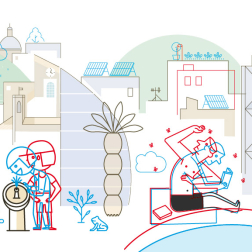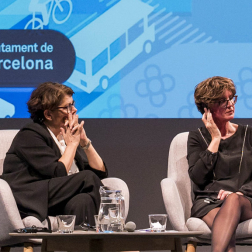



It is the roadmap to make Barcelona a climate-neutral city and well-adapted to climate change by 2030.
They are places where you can protect yourself from excessive heat or cold if you don’t have sufficient thermal comfort at home.
During heatwaves, a change in habits will help us keep cool and keep our homes cool. Taking care of ourselves.
Home
BARCELONA FACING CLIMATE CHANGE
Given the challenges posed by the climate emergency, Barcelona is taking measures to reduce emissions but also to adapt to the effects the city is already experiencing and will increasingly experience. Barcelona is therefore becoming a proactive city that adopts a comprehensive approach to tackling climate change and assumes its responsibility in that regard; a city that can find opportunities in difficulties and adapts to new climate conditions intelligently, generating co-benefits for people and socio-economic activity.
Discover the
Climate Plan
El Pla Clima pretén ser una visió integradora de les mesures per fer front al canvi climàtic, que permeti assolir els objectius del nou Pacte d’Alcaldes i Alcaldesses per l’Energia i el Clima que ha signat l’Ajuntament de Barcelona.
Barcelona has a specific plan for the climate emergency, the Climate Plan 2018-2030, the four key areas of which are mitigation, adaptation, citizen action and climate justice.
Barcelona's strategy for tackling climate change:
- Focuses on people, because climate change directly affects the health and quality of life of citizens.
- Seeks to comprehensively transform the city in order to tackle the risks and turn them into opportunities.
- Speeds up efficiency, renovation and the introduction of renewable energies so we are better adapted.
- Approaches this through a process of co-production with city residents.

News
-
 20/12/2024 - 12:10 h Environment and sustainability Preventive warning for PM10 pollution deactivated
20/12/2024 - 12:10 h Environment and sustainability Preventive warning for PM10 pollution deactivatedThe stations belonging to the Atmospheric Pollution Monitoring and Forecast Network have recorded a drop in levels of particulate matter (PM10), allowing the warning to be deactivated.
-
 19/12/2024 - 12:06 h Environment and sustainability Activation of preventative warning stage for high levels of PM10
19/12/2024 - 12:06 h Environment and sustainability Activation of preventative warning stage for high levels of PM10Municipal services are taking preventative measures, such as more intense watering down of streets and avoiding the use of air blowers.
-
 17/12/2024 - 10:21 h Commerce and markets Gas heaters prohibited on bar and restaurant terraces from 1 January
17/12/2024 - 10:21 h Commerce and markets Gas heaters prohibited on bar and restaurant terraces from 1 JanuaryThe measure comes as part of the by-law on terraces approved in 2018.
-
 03/12/2024 - 14:29 h Environment and sustainability Barcelona grants six projects aimed at tackling the drought
03/12/2024 - 14:29 h Environment and sustainability Barcelona grants six projects aimed at tackling the droughtSix innovative projects for improving the water cycle in Barcelona have been selected to receive BIT Habitat's "La ciutat proactiva” grants for urban innovation.
FAQS
-
The answer to this question is made up of various arguments that complement one another:
- Because this is the first climate change caused by human activity, while the previous episodes were the result of natural causes.
- Because this is the fastest climate change ever experienced on Earth.
- Because it is causing an increase in average temperatures which has clear and serious effects on ecosystems and people.
- Because it is unjust and causes inequalities. Not all countries are equally responsible for generating greenhouse gases, and not all countries have the same capacity to adapt. In fact, the countries most affected and with the greatest difficulties adapting to the changes are those that have contributed least to the problem. It is therefore a problem that goes beyond strictly environmental aspects to become a question of ethics and responsibility.
-
Cities are part of the climate change problem, as the majority of emissions and energy consumption are concentrated in cities around the world, but for that reason they are also a key part of the solution.
In general terms, the majority of cities are already experiencing the impacts associated with climate change, such as effects on health, increasing temperatures, aggravation of the urban heat island effect, more periods of drought, more flooding, more heat waves, rising sea levels, reduction in water resources, etc. Local government measures are crucial to managing climate change issues, both on a local scale, because they increase the quality of life of city residents, and on a global scale, since the world’s urban populations make up over 54% of the planet’s inhabitants. In the European Union, 74% of the population lives in urban areas, consuming 75% of the energy.
Cities and their metropolitan surroundings demonstrate a close link between urbanisation, energy use and greenhouse gas emissions. Urban density and layout are key factors in influencing energy consumption, especially in the transport and construction industries.
-
An increase in the number of heat waves and reduced availability of water for consumption. There will be more heat waves and they will also be more intense and longer lasting. Night-time temperatures will go up too, particularly in neighbourhoods near the coast. The first challenge to tackle is the heat waves. In the last 34 years, there have been eight such episodes in the city. The most intense of these was in 1982 but the longest occurred in 2003, lasting for 13 days.
Night-time temperature increases may cause problems for people's rest and recuperation. The neighbourhoods closest to the coast might be the worst affected by the increase in night-time temperatures. These increases could have consequences for people's health, as the nocturnal period of rest is the time when people recover from the whole day.
On the other hand, by 2050 it is anticipated that there will be a reduction in the availability of water resources and that demand will have increased by 4%. The city will need an additional 18 hm3 of water per year.
-
From the perspective of climate justice, the most important challenges posed by climate change will be tackling energy poverty, health problems linked to heat waves and increasing food prices. With climate change, and given the demographic and socio-economic dynamics of the city, the population most vulnerable to energy poverty will increase in size.
Although the future forecasts talk about a reduction in energy demand for heating buildings, the demand for energy and water supplies will increase with climate change (ventilation and refrigeration systems, personal hygiene and laundry). Households will have to deal with the higher costs of meeting their demand for electricity and water (not gas). In the coming years, there will be an increase in the number of households with dependent children and single-person households due to the growth in migratory movements and the ageing population.
In short, energy poverty will have to be redefined with climate change: there will be a fall in energy demand for heating but an increased demand for water and electricity for ventilation and climate control in buildings. The population most vulnerable to energy poverty will increase in size, given the demographic and socio-economic dynamics of the city.














